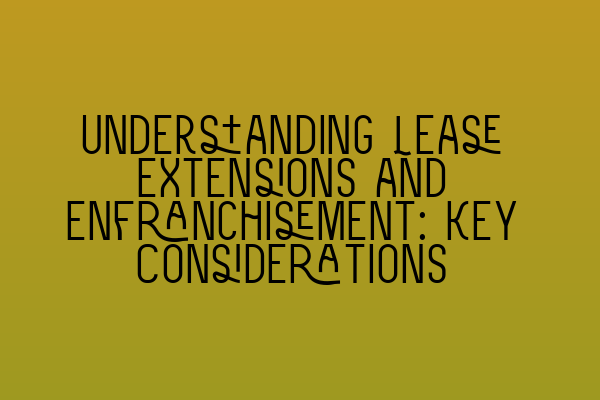Understanding Lease Extensions and Enfranchisement: Key Considerations
As property owners, it is essential to have a thorough understanding of lease extensions and enfranchisement. These concepts play a vital role in the world of property law, determining the rights and responsibilities of both landlords and leaseholders. In this blog post, we will explore the key considerations surrounding lease extensions and enfranchisement, providing you with the information you need to navigate these complex legal processes.
Before we delve into the details, it’s important to define what lease extensions and enfranchisement are. A lease extension occurs when a leaseholder extends the length of their lease agreement with the landlord. This typically happens when the lease term is approaching its expiration date. On the other hand, enfranchisement refers to the process by which leaseholders collectively purchase the freehold interest in their property.
Now, let’s take a closer look at some key considerations when it comes to lease extensions and enfranchisement:
1. Eligibility for Lease Extensions:
To be eligible for a lease extension, leaseholders must meet certain criteria. Firstly, they must have owned the property for at least two years. Additionally, the leaseholder must hold a long lease, which is typically defined as having a lease term of more than 21 years when originally granted. It’s important to note that not all leases are eligible for extension, so it is crucial to consult with a solicitor to determine the specific requirements in your situation.
2. Statutory vs. Non-Statutory Lease Extensions:
Lease extensions can be pursued through either statutory or non-statutory routes. A statutory lease extension is governed by the Leasehold Reform, Housing, and Urban Development Act 1993, providing leaseholders with certain rights and protections. This route typically involves a formal process and set timelines. On the other hand, non-statutory lease extensions are negotiated directly between the leaseholder and the landlord. While non-statutory extensions may offer more flexibility, it is important to carefully consider the terms and implications before proceeding.
3. The Calculation of the Lease Extension Premium:
When extending a lease, leaseholders are generally required to pay a lease extension premium to the landlord. The premium is determined by various factors, including the value of the property, the length of the remaining lease, and the ground rent payable. It is crucial to obtain an accurate valuation of the property to ensure a fair premium is negotiated. Engaging a qualified valuer or surveyor can help in providing an informed estimate and avoiding potential disputes.
4. The Enfranchisement Process:
Enfranchisement allows leaseholders to collectively purchase the freehold interest in their property, providing greater control and ownership rights. This process is governed by the Leasehold Reform Act 1967 and the Leasehold Reform, Housing, and Urban Development Act 1993. To initiate the enfranchisement process, leaseholders must form a group and serve a notice of claim on the landlord. It is essential to consult with a solicitor experienced in enfranchisement matters to navigate this complex process smoothly.
5. Collective Enfranchisement:
Collective enfranchisement is particularly relevant for leaseholders of flats within a building. It allows leaseholders to collectively purchase the freehold of the entire building, including the communal areas and any surrounding land. This can be a complicated process, involving multiple leaseholders and extensive legal requirements. Seeking expert legal advice is essential to ensure all the necessary steps are taken and the rights of all parties are protected.
Understanding the intricacies of lease extensions and enfranchisement is essential for property owners. By familiarizing yourself with these concepts, you can make informed decisions and protect your rights as a leaseholder.
If you want to delve deeper into related topics, you may find the following articles helpful:
– Misrepresentation in Contracts: Unveiling Deceptive Practices
– A Closer Look at SQE Contract Law Syllabus
– SQE Contract Law: Analyzing Landmark Cases and Influential Judicial Decisions
– Understanding Contractual Capacity: Rights and Limitations
– Interactive SQE Mock Tests for Contract Law: Test Your Knowledge
In conclusion, lease extensions and enfranchisement are complex legal processes that require careful consideration and expert guidance. By understanding the eligibility criteria, different pathways, valuation calculations, and steps involved, property owners can navigate these processes successfully. Seeking the assistance of a qualified solicitor specializing in property law is crucial to ensure your rights are protected and your interests are safeguarded throughout the lease extension or enfranchisement journey.
